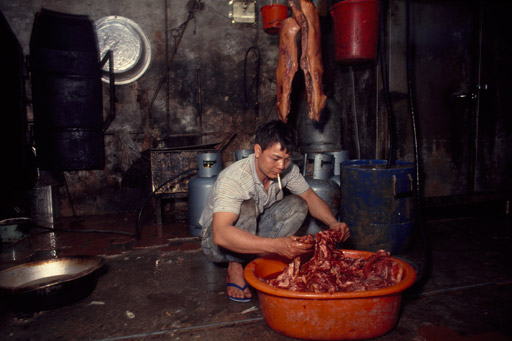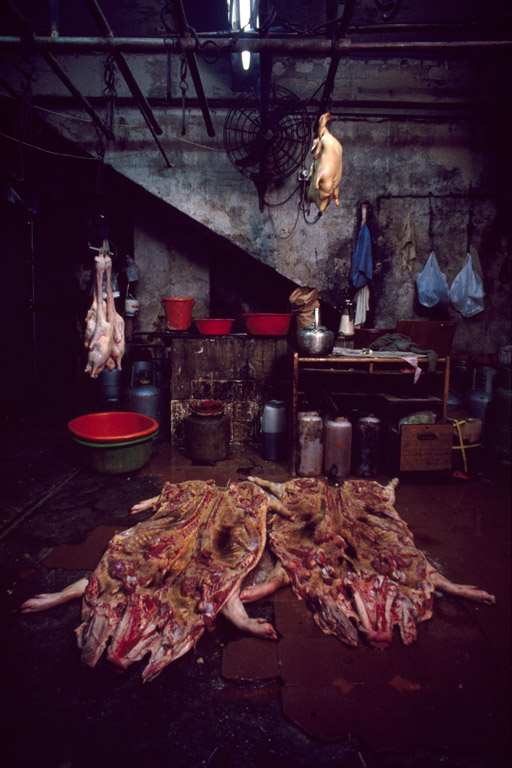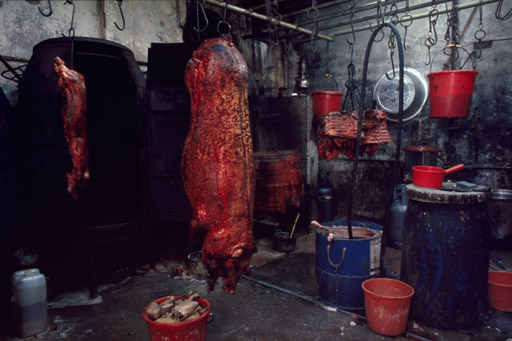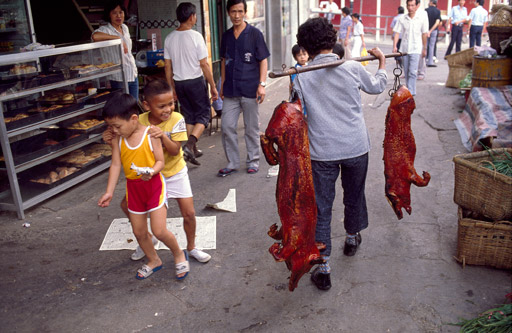WELL ROASTED

Yim Kwok Yuen opened his cooked meat factory on Lo Yan Street in 1981, a few years after his arrival in Hong Kong and just three years before the City’s clearance was announced. A thriving business, he and his brother continued working there until the factory was closed during the first phase of the clearance operation in the summer of 1991.
“I came to Hong Kong in 1978, when I was 35 year old, from Ching Yuen county in Kwangtung Province where I was a farmer. My parents were old and, as the eldest of my five brothers and sisters, I had to support the family. Life was not very different from death in China. We worked really hard for very little return. I started work at 4am and my daily salary was 20 to 30 cents. We did not have our own farm and, when hungry, we only had rice husks or the grass to eat. You felt cold and hungry in the winter, and in the summer there were lots of mosquitoes.
From 1971 onwards, I tried almost every year to sneak into Hong Kong. I didn’t have to swim far but I had to climb hills after crossing a river about one metre deep. I was scratched by the bushes. I always used the same route, and each time I was caught I was imprisoned and starved. I often fainted. If I had been given my own fields I would not have tried to come here.
When I finally arrived in Hong Kong, I lived with my uncle and worked in a shop which made roasted food. After several months’ apprenticeship, I went to work in my uncle’s roasting shop in the Walled City. When my younger brother arrived in Hong Kong three years later, I started my own roasted food business, selling the cooked meat on the streets.
Initially, I made the roasted food in my uncle’s shop and sold it. Then I rented this processing shop three years ago. I sell the food on the streets myself. If I delivered it to a retail shop, the profit would be much less. I am unlicensed hawker and I sell in Wong Tai Sin market. I have been arrested five times since the computerisation of records. You have to deposit a bail of $700 and the fine is $500 increasing by $10 for each arrest. In Wong Tai Sin, they confiscate the food but return the tools and cart. The cart is worth more than $1000.
I start work every day at 4am. I do not need an alarm clock – my body wakes me up. I start to roast the meat then, and sell it in the market from 6:15am to 8am. As I am a hawker, I am not allowed to sell in the streets after 8am. I then come back for breakfast and at 9am start work again to prepare the meat to be roasted in the afternoon. At about 10am I return home to cook lunch and have a rest before coming back to the shop to roast. At about 3pm I go to the market again, returning home at around 7 or 8pm.
My brother and I manage the shop here. The roasted food we prepare includes chicken, goose and pork. To make the food, we use flavouring, salt, sugar and so on. I you can afford it you can use good Chinese wine, but otherwise a cheap one will do.

For pork, we have to call a buyer to purchase a pig from the Cheung Sha Wan abattoir. When the pig is delivered, we cut it, wash it and put it in the refrigerator. We normally have 10 or more pigs in stock. The whole process of preparing one roasted pig takes three hours. The cooking itself takes an hour. You have to roast the pig until it is 20 to 30 per cent cooked, take it out of the oven and pierce it to let the air out from the skin – otherwise it does not look good. Then you have to heat the skin with a hot flame so that bubbles appear and make it crispy.
We use the cart to carry the food to the market. We work hard, even though the temperature is very high in the summer. The refrigerator is noisy, and the oven is noisy and hot. We sweat tremendously. We have fans in our workshop, but we have no cover in the market. We have cockroaches and rats too, which we feed. Occasionally, of course, when our customers criticise our food or don’t buy it, we feel unhappy. The life is difficult but, as the returns belong to us, it’s worthwhile.
We mostly sell roast pig. If the hawker control team doesn’t come, we can sell about three pigs in one day and earn $2000 to $3000; if the team comes, we can only sell one. During the festival periods we can sell 20 to 30 pigs in a day, and as festivals always fall on public holidays the hawker control teams don’t come. We have no sleep on those days.
The shop is not licensed either and is rented. Outside the Walled City you must have a licence, although the Government has stopped issuing them for processing shops and only grants them to retail outlets. We have never been inspected, but we are cleaner than the famous workshops outside; they often don’t wash and clean the pigs first.
When I had earned enough, I went to Canton and got married. I now have a son and have applied for my wife and child to come to Hong Kong. I first applied eight years ago, but I’ll be satisfied if they can come before the Walled City is demolished.

I own two flats in the Walled City. The first one cost me around $80,000. The living environment is bad and it has no windows. The second flat is a few stories higher in the same building and it has windows. I had intended to sell the first flat, but then the demolition was announced. The compensation for demolition is around $800,000 for the two flats.
My brother, my uncle and I live together in one flat. The other flat is rented out at $800 a month. Before I bought the first flat, I rented a place here in the City – eight single men lived in a room of 200 square feet. There are three bedrooms and two living rooms in my house. We have an air-conditioner, though we only use it on the hottest days; we also have a television and a washing machine.
The rent for the workshop is $2000 a month, with electricity and water charges included. I believe that half of the water is stolen from the mains, while the other half comes from the well, We all use well-water but we use water from the mains for drinking. We have never had a power failure.
I don’t think I will make any profit from the demolition of the Walled City except that I may get a new house. For rented premises, the Government will only compensate with a relocation fee. When I started my business, the initial capital outlay was $30,000 but I would need $50,000 to start up again. I have not decided where to go after the demolition. If I opt for a unit on a housing estate, the compensation will drop from $400,000 to $130,000 and I have to pay the rent. If I buy a new house, I need several hundred thousand more for renovation. I also have to give a house to my brother.
If possible, I would like the Government to compensate me for the shop by giving me a stall; It will be difficult to operate a processing workshop in future. If I want to have it properly licensed, I will have to go to a rural area. The roasted food will have to be transported to an urban district and it will be cold before it gets there. I have to decide on my place of business before I can decide where to settle.
I was not scared of anything when I came to Hong Kong. After all, no one ill-treated you here. I came from a poor village where the hygiene conditions were much worse. Only the air was better. Coming from such a poor place, I thought Hong Kong was heaven. The Walled City is alright; I came from a worse environment, so I’ve never really thought of it as bad. If I had had a job or money, I would have considered leaving, but I’m not educated and it would have been very difficult to survive anywhere else.”
